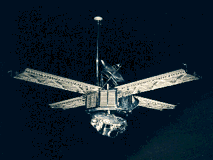Mariner 6,7
Part of the Mariner program
 Mariners 6 and 7 were designed to fly over the equator and southern hemisphere of Mars. Mariner 6 encountered Mars on July 31,1969 and was quickly followied by Mariner 7 on August 4, 1969. The two spacecraft returned a combined total of 143 approach pictures of the planet and 55 close-up pictures. These images, from the vehicles' television cameras, included pictures of the northern and southern polar caps as well as Phobos, one of Mars' two moons. The spacecraft also studied the Martian atmosphere and profiled its chemical composition. Closest approach to Mars for both spacecraft was approximately 3,550 kilometers. The cost of the two missions was $148 million.
Mariners 6 and 7 were designed to fly over the equator and southern hemisphere of Mars. Mariner 6 encountered Mars on July 31,1969 and was quickly followied by Mariner 7 on August 4, 1969. The two spacecraft returned a combined total of 143 approach pictures of the planet and 55 close-up pictures. These images, from the vehicles' television cameras, included pictures of the northern and southern polar caps as well as Phobos, one of Mars' two moons. The spacecraft also studied the Martian atmosphere and profiled its chemical composition. Closest approach to Mars for both spacecraft was approximately 3,550 kilometers. The cost of the two missions was $148 million.
Spacecraft
The eight sided magnesium structure contained seven electronics compartments. One small hydrazine rocket engine used for trajectory corrections. Solar panels generated 830 W maximum (450 watts at Mars). AgZn batteries. Dual S-Band transmitters provided telemetry at 8.33 and 16200 bps. 3-axis
stabilized to 0.05 deg using 12 cold gas jets. 157 Mbits data storage.
Payload
The planetary experiments (59 kg) included two television cameras, an infrared radiometer, an infrared spectrometer, and an ultraviolet spectrometer. These sensors took TV pictures of Mars and measured the ratio of refractivity and UV and IR emissions of the atmosphere.
| Country of Origin | United States |
| Customer/User | NASA |
| Manufacturer(s) | JPL |
| Size | 3.35 m from scan platform to top of LGA |
| Orbit | Solar orbit - Direct flyby trajectories. |
| Related Sites | JPL Mariner 6-7 Summary |
Launch Facts
| Name | Int'l Desig. | Date | Site | Vehicle | Orbit | Mass(kg) |
| Notes | ||||||
| Mariner 6 | 1969-014A | 2/24/69 | ESMC | Atlas Centaur | Solar | 412 |
| Mars flyby 7/31/69; returned 75 images of Martian surface | ||||||
| Mariner 7 | 1969-030A | 3/27/69 | ESMC | Atlas Centaur | Solar | 412 |
| Mars flyby 8/5/69; returned 126 images of Martian surface | ||||||
Information in The Mission and Spacecraft Library is provided without warranty or guarantee. USE AT YOUR OWN RISK.